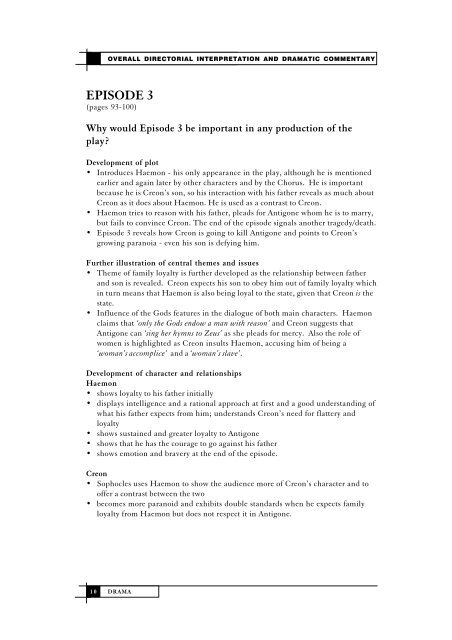PDF file: Drama - Higher - Antigone - Education Scotland
PDF file: Drama - Higher - Antigone - Education Scotland
PDF file: Drama - Higher - Antigone - Education Scotland
You also want an ePaper? Increase the reach of your titles
YUMPU automatically turns print PDFs into web optimized ePapers that Google loves.
10<br />
OVERALL DIRECTORIAL INTERPRETATION AND DRAMATIC COMMENTARY<br />
EPISODE 3<br />
(pages 93-100)<br />
Why would Episode 3 be important in any production of the<br />
play?<br />
Development of plot<br />
• Introduces Haemon - his only appearance in the play, although he is mentioned<br />
earlier and again later by other characters and by the Chorus. He is important<br />
because he is Creon’s son, so his interaction with his father reveals as much about<br />
Creon as it does about Haemon. He is used as a contrast to Creon.<br />
• Haemon tries to reason with his father, pleads for <strong>Antigone</strong> whom he is to marry,<br />
but fails to convince Creon. The end of the episode signals another tragedy/death.<br />
• Episode 3 reveals how Creon is going to kill <strong>Antigone</strong> and points to Creon’s<br />
growing paranoia - even his son is defying him.<br />
Further illustration of central themes and issues<br />
• Theme of family loyalty is further developed as the relationship between father<br />
and son is revealed. Creon expects his son to obey him out of family loyalty which<br />
in turn means that Haemon is also being loyal to the state, given that Creon is the<br />
state.<br />
• Influence of the Gods features in the dialogue of both main characters. Haemon<br />
claims that ‘only the Gods endow a man with reason’ and Creon suggests that<br />
<strong>Antigone</strong> can ‘sing her hymns to Zeus’ as she pleads for mercy. Also the role of<br />
women is highlighted as Creon insults Haemon, accusing him of being a<br />
‘woman’s accomplice’ and a ‘woman’s slave’.<br />
Development of character and relationships<br />
Haemon<br />
• shows loyalty to his father initially<br />
• displays intelligence and a rational approach at first and a good understanding of<br />
what his father expects from him; understands Creon’s need for flattery and<br />
loyalty<br />
• shows sustained and greater loyalty to <strong>Antigone</strong><br />
• shows that he has the courage to go against his father<br />
• shows emotion and bravery at the end of the episode.<br />
Creon<br />
• Sophocles uses Haemon to show the audience more of Creon’s character and to<br />
offer a contrast between the two<br />
• becomes more paranoid and exhibits double standards when he expects family<br />
loyalty from Haemon but does not respect it in <strong>Antigone</strong>.<br />
DRAMA
















